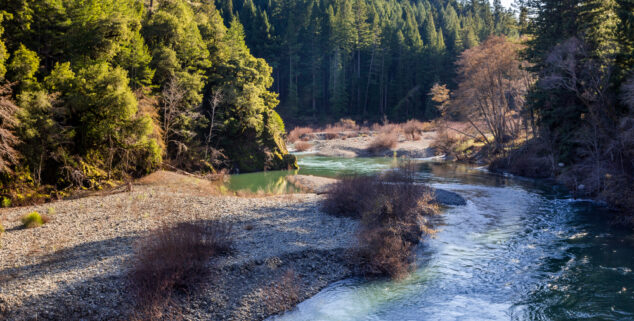Opinion
Conservation goals require Newsom to prioritize partnerships with tribes
 Photo by Rising Star via Shutterstock
Photo by Rising Star via ShutterstockOPINION – As Yuki descendants, my family prided ourselves in our plentiful clean water, and our beautiful valleys and mountains. We had fresh water available from our well, healthy fisheries, and loved spending endless summers in our rivers and at Howard Creek, 30 minutes north of Fort Bragg on the coast.
Today, our rivers and our people on the reservation struggle. California’s third-largest watershed, the Eel River, provides drinking water for thousands. Climate change and diversions threaten our river as we are at a loss of our fish, and our cultural identity. It’s clear, if we don’t act now future generations won’t have clean water to drink, fresh fish to eat, or clear rivers to swim in.
Worldwide scientists assert preventative measures related to severe impacts of climate change require a minimum protection of 30 percent of the planet’s land and waters by 2030. In 2020, by executive order, Governor Newsom launched California’s 30×30 effort, the following year the Biden Administration set the same federal target. California Natural Resources Agency (CNRA) estimates California must protect six million acres of land and 500,000 acres of coastal waters in less than seven years.
I ask California leaders to accelerate conservation efforts in Round Valley and all of Indian Country. Our leaders must prioritize Tribal partnership opportunities to achieve 30×30. We are the original stewards of these lands, leaders in a new era of conservation centering Indigenous Rights, Tribal Sovereignty, and Tribal Ecological Knowledge (TEK).
To protect our endangered, wild and scenic Eel River now and into the future, our leaders must prioritize Tribal partnerships.
In 2022, CNRA released its Pathways to 30×30 report outlining state plans to achieve its goals. To date state progress reflects protecting the Randall Preserve in southern California, culturally significant to the Gabrieleño-Tongva San Gabriel Band of Mission Indians, the Juaneño Tribal Council, and the Juaneño Band of Mission Indians, Acjachemen Nation. In addition the Newsom Administration established a $100M fund to strengthen partnerships with Tribes statewide, and the legislature passed AB 2278.
While early wins are worth celebrating, the Newsom Administration proposed disproportionate budget cuts to 30×30 programs. The justification of these cuts express that conservation and appropriate management of our endangered natural resources is a luxury, not a necessity.
Attainable opportunities in the state to reach California’s 6 million-acre goal are present. The Power in Nature coalition identified over 80 potential places to conserve in California as part of 30×30, four priority focus areas include: biodiversity, climate resilience, Tribal coordination, and equity/access. Equally substantial is Senator Dave Min’s (SD-37) proposed legislation codifying 30×30 to hold state agencies accountable. Passing this legislation is needed to build equitable collaborations and co-management efforts.
Round Valley Indian Tribes (RVIT) federally recognize seven Northern California Tribes. Ancestral territories of these tribes span from the California Nevada border to the Pacific Coast. The aboriginal RVIT tribes of the Eel River basin include the Yuki and Wailakai. Historically seven Yuki tribes thrived traveling the waterways of the Eel River from mountain ranges and valleys to the coast for food sustenance.
To protect our endangered, wild and scenic Eel River now and into the future, our leaders must prioritize Tribal partnerships. Senior Water Rights holders such as RVIT are a critical asset, as are all Indigenous People in this global effort. We are here, struggling, and experiencing painful losses of our resources and our culture. Protecting our most precious natural resources must remain a priority. We deserve our rights to treatment as a state, protection as dependent nations, and the right to our cultural religious practices related to our lands and waters.
Nikcole Whipple is a descendant of the Yuki, Little Lake Pomo, Nomlacki, Maidu, Concow Tribes and is an intern with Save California Salmon
Want to see more stories like this? Sign up for The Roundup, the free daily newsletter about California politics from the editors of Capitol Weekly. Stay up to date on the news you need to know.
Sign up below, then look for a confirmation email in your inbox.

Leave a Reply